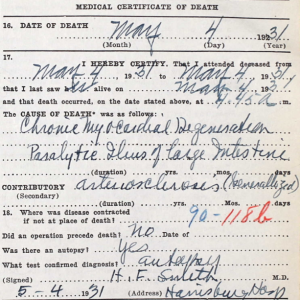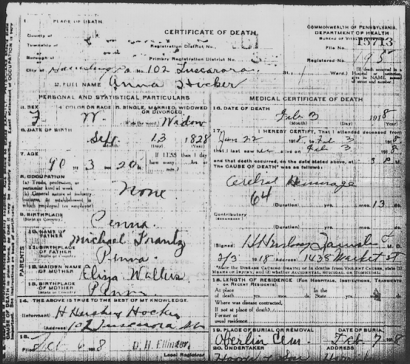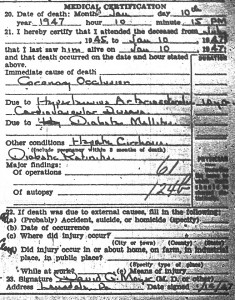What Was the Cause of Death?
 I’ve been data mining the Pennsylvania Death Certificates, 1906-1963 on Ancestry.com for records for Hockers (and Hackers). So far, I’ve compiled a collection of 691 death certificates for Hockers (male and female) and their children.
I’ve been data mining the Pennsylvania Death Certificates, 1906-1963 on Ancestry.com for records for Hockers (and Hackers). So far, I’ve compiled a collection of 691 death certificates for Hockers (male and female) and their children.
Since genetic disease has been on my mind a lot lately, I thought it would be an interesting exercise to see what these family members died from. Here’s how the results tallied up:
- Adherent pericardium: 1 death
- Alcoholism: 2 deaths
- Amytrophic lateral sclerosis: 1 death
- Angina Pectoris: 3 deaths
- Anoxia: 1 death
- Apoplexy: 72 deaths
- Appendicitis: 1 death
- Arterio Thrombosis: 1 death
- Arteriosclerosis: 31 deaths
- Asphyxia: 3 deaths
- Atelectasis: 2 deaths
- Auricular fibrillation: 1 death
- Bright’s Disease/Nephritis: 18 deaths
- Bronchitis: 4 deaths
- Cancer: 71 deaths
- Abdomen: 2 deaths
- Adenocarinoma: 1 death
- Bladder: 3 deaths
- Brain: 1 death
- Breast: 11 deaths
- Bone: 1 death
- Cervix: 1 death
- Colon: 9 deaths
- Intestines: 2 deaths
- Kidney: 2 deaths
- Liver: 8 deaths
- Mouth/Tongue: 1 death
- Ovarian: 5 deaths
- Peritoneus: 1 death
- Prostate: 4 deaths
- Rectum: 1 death
- Skin: 2 deaths
- Stomach: 10 deaths
- Throat: 1 death
- Unknown type: 2 deaths
- Uterine: 4 deaths
- Carbon Monoxide Poisoning: 1 death
- Cardiovascular Disease: 5 deaths
- Cardio-Renal Disease: 9 deaths
- Cardio-Repiratory Failure: 1 death
- Cerebral Arteriosclerosis: 2 deaths
- Cerebral Embolism: 1 death
- Cerebral Hemorrhage (not as apoplexy): 3 deaths
- Cerebral Meningitis: 2 deaths
- Cerebral Thrombosis: 7 deaths
- Cerebral Vascular Occlusion: 1 death
- Chicken Pox: 1 death
- Cholera Infantum: 3 deaths
- Cirrhosis: 1 death
- Congestive Heart Failure: 6 deaths
- Congenital Debility: 2 deaths
- Convulsions: 2 deaths
- Coronary Arteriosclerosis: 3 deaths
- Coronary Embolism: 4 deaths
- Coronary Infarction: 1 death
- Coronary Occlusion: 26 deaths
- Coronary Thrombosis: 14 deaths
- Dementia: 3 deaths
- Diabetes: 5 deaths
- Diptheria: 1 death
- Dropsy (Edema): 1 death
- Dysentery: 3 deaths
- Electrocution: 1 death (work accident)
- Encephalitis Lethargica (Sleepy Sickness): 2 deaths
- Endocarditis: 4 deaths
- Dilation (Dilatation) of Heart: 13 deaths
- Epiglotal Spasm: 1 death
- Fractured Skull: 6 deaths (4 from auto accidents)
- Gangrene: 2 deaths
- Gastric Ulcers: 2 deaths
- Gastritis: 1 death
- Gastro Enteritis: 4 deaths
- Gastro-Intestinal Rupture: 2 deaths
- Gun Shot Wound: 4 deaths
- Heart Arrhythmia: 1 death
- Heart Disease: 10 deaths
- Heart Failure: 14 deaths
- Heat Exhaustion: 1 death
- Hemorrhage: 3 deaths — not associated with vehicular accident
- Hyperemesis Gravidarum: 1 death
- Hypertension: 1 death
- Hypostasis: 1 death
- Illio Collitis: 2 deaths
- Inanition: 3 deaths
- Indigestion: 1 death
- Intestinal Obstruction: 2 deaths
- Left heart failure: 2 deaths
- Liver Atrophy: 1 death
- Lymphosarcoma: 1 death
- Marasmus: 2 deaths
- Meningitis: 2 deaths
- Mesenteric Occlusion: 1 death
- Mitral Disease (including Mitral Stenosis): 8 deaths
- Multiplesclerosis: 1 death
- Myelogeneous Luekemia: 1 death
- Myocarditis: 37 deaths
- Myocardial Infarction: 11 deaths
- Nephritis (Acute): 1 death (see Bright’s Disease for Chronic Nephritis)
- Old Age: 1 death
- Paralysis: 3 deaths (Apoplexy?)
- Paralyis Agitans (Parkinson’s Disease): 1 death
- Paresis: 1 death (late state Neurosyphilus)
- Patent Foramen Ovale: 2 deaths
- Pelvic Abscess: 1 death
- Peritonitis: 2 deaths
- Pernicious Anaemia: 2 deaths
- Phlegmonous Erysipelas (Abscesses): 1 death
- Pneumonia:
- Bronchial pneumonia: 12 deaths
- Catarrhal pneumonia: 1 death
- Croupous pneumonia: 1 death
- Hypostatic pneumonia: 7 deaths
- Lobar pneumonia: 9 deaths
- Pneumonia: 14 deaths
- Pneumonia & Influenza: 4 deaths
- Premature Births: 11 deaths
- Protracted Labor: 2 deaths
- Pulmonary Edema: 5 deaths
- Pulmonary Embolism: 5 deaths
- Pulmonary Infarction: 1 death
- Pulmonary Thrombosis: 3 deaths
- Renal Embolism: 1 death
- Renal Occlusion: 1 death
- Rheumatic Heart Disease: 2 deaths
- Septicemia: 5 deaths
- Shock: 1 death (fell in ice cold lake)
- Stillborn: 23 deaths
- Strangulated Inguinal Hernia: 2 deaths
- Strangulation: 1 death (accidental, due to Epilepsy)
- Streptoccocal Meningitis: 1 death
- Suffocation: 1 death
- Surgical Complications:
- Caesarian: 1 death
- Hysterectomy: 1 death
- Prostate surgery: 1 death
- Shock: 1 death
- Syphilus: 1 death
- Tertiary Luetic Aortic Aneurysm: 1 death
- Toxemia-Eclampsia: 1 death
- Tuberculosis: 25 deaths
- Typhoid Fever: 5 deaths
- Unknown: 2 deaths
- Unknown, pending inquest: 5 deaths
- Uremia: 18 deaths
- Valvular Disease: 11 deaths
- Valvular Insufficiency: 1 death
- Vehicular Accident (Auto, Motorcycle, etc): 6 deaths
- Whooping Cough: 1 death
Some of the causes of death were sad and some of the causes were surprising in that I’d never heard of them.
For instance, one of my great great uncles died of Encephalitis Lethargica. Apparently, between 1915 and 1926 there was a worldwide epidemic of the disease which attacks the brain and leaves the person in a statue-like position, speechless and motionless.1 In both instances the Hockers died in the 1930s after having the disease for four and eleven years, respectively.
My heart hurt seeing the number of premature and stillborn babies that were born to Hocker families, including one pair of Siamese twins. Some of these children would have likely survived in neonatal wards today though they had little chance of survival in the early 20th century.
Heart disease, renal disease, cancer and strokes seem to be the top killers amongst this group of Hockers. And heart disease and stroke are still common causes of death today.


